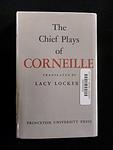Pierre Corneille
Pierre Corneille was a 17th-century French dramatist, often considered one of the three great French playwrights of his era, alongside Molière and Racine. He is known for pioneering the genre of the French classical tragedy with his plays such as 'Le Cid' and 'Horace'. His work had a significant influence on the development of French literature and drama.
Books
This list of books are ONLY the books that have been ranked on the lists that are aggregated on this site. This is not a comprehensive list of all books by this author.
-
1. Le Cid
"Le Cid" is a dramatic play that follows the story of a young nobleman who is torn between love and honor. The protagonist is faced with a dilemma when he is ordered to kill his beloved's father in a duel to defend his own father's honor. Despite his love for his girlfriend, he chooses honor over love and kills her father, leading to a series of tragic events. The play explores themes of duty, honor, and the moral complexities of revenge.
-
2. Plays
This collection of plays by a renowned 17th-century French dramatist features a variety of works that have significantly influenced the development of classical French tragedy. The plays often explore themes of honor, fate, and moral integrity, with complex characters who grapple with high-stakes moral and ethical dilemmas. The author's skillful use of language and his innovative approach to dramatic structure and characterization have made these plays enduring classics of French literature.
-
3. Polyeucte
The play is a tragic drama set in ancient Armenia, revolving around its titular character, a Christian convert who defies the Roman Empire's pagan religious edicts. Polyeucte's newfound faith leads to a cascade of consequences, as he destroys pagan temples, which not only angers the authorities but also strains his marriage to Pauline, who is still a pagan. His actions set off a complex interplay of duty, faith, and love, as characters grapple with their beliefs and loyalties. Ultimately, Polyeucte's steadfastness in his faith leads to his martyrdom, while his sacrifice and the strength of his convictions inspire others, including Pauline, to embrace Christianity, highlighting themes of religious conviction, sacrifice, and redemption.
-
4. Nicomède
"Nicomède" is a classic French tragicomedy that revolves around the political and emotional turmoil within the royal court of Bithynia, an ancient region in Asia Minor. The play centers on the titular character, a noble and valiant prince who finds himself caught in a web of court intrigue and familial strife. As the legitimate heir to the throne, Nicomède must navigate the treacherous waters of loyalty and ambition, while contending with the favoritism shown by his father, King Prusias, towards his younger half-brother. The drama unfolds against a backdrop of shifting alliances, romantic entanglements, and the looming threat of Roman intervention, culminating in a test of virtue and the true nature of sovereignty.
-
5. Horace
The play "Horace" is a classic French tragedy that revolves around the conflict between Rome and Alba Longa, which is to be decided by a combat between two sets of triplets: the Roman Horatii and the Alban Curiatii. The central character, Horace, is a Roman warrior who, in his patriotic fervor, faces a profound moral dilemma when his sister Camilla is betrothed to one of the Curiatii brothers. The drama intensifies when, after a victorious but tragic battle, Horace kills his sister in a fit of rage for mourning the enemy's death over Rome's victory. This act of fratricide leads to a trial where Horace must defend his actions before the state and his family, raising questions about duty, honor, and the price of allegiance to one's country.
-
6. Cinna
"Cinna" is a classic French tragedy set in ancient Rome, focusing on themes of clemency and tyranny. The play revolves around the titular character, a nobleman involved in a conspiracy to assassinate Emperor Augustus. As the plot unfolds, the conspirators grapple with their moral dilemmas and the consequences of their actions. The emperor, upon discovering the plot, faces his own internal struggle between his desire for justice and the virtue of forgiveness. The narrative explores the complexities of power, loyalty, and the human capacity for mercy, culminating in a surprising act of leniency that challenges the traditional expectations of retribution in tragedy.
-
7. Rodogune
"Rodogune" is a classic French tragedy that revolves around the intense political and familial conflicts within the Seleucid Empire. The story unfolds with the queen mother, Cleopatra, who, in her quest for power, pits her twin sons against each other, offering her hand in marriage to whichever son secures the throne. The titular character, Rodogune, a Parthian princess and the love interest of both princes, becomes the pawn in this deadly game of thrones. As the brothers grapple with their love for Rodogune and their desire for power, the play explores themes of ambition, loyalty, and the tragic consequences of a mother's manipulative schemes.
-
8. The Illusion
"The Illusion" is a play that explores themes of love, betrayal, and the blurred lines between reality and illusion. It follows a contrite father who enlists the help of a magician to locate his estranged son. The magician presents the father with a series of visions that depict his son's tumultuous life as a lover and duelist. As the father witnesses these scenes, he is confronted with the consequences of his own past actions and the nature of his son's reality. The play delves into the power of theater and spectacle, ultimately questioning the nature of truth and the transformative power of forgiveness and understanding.






